The internal representation of a Polynomial is an array of t
The internal representation of a Polynomial is an array of terms. Each term contains a coefficient and an exponent, e.g., the term 2x^4 has the coefficient 2 and the exponent 4. Develop a complete class containing proper constructor and destructor functions as well as set, get, and print functions. The class should also provide the following overloaded operator capabilities: Overload the addition operator (+) to add two Polynomials. Overload the subtraction operator (-) to subtract two Polynomials. Overload the assignment operator to assign one Polynomial to another. Overload the multiplication operator (*) to multiply two Polynomials. Overload the addition assignment operator (+=), subtraction assignment operator (-=), and multiplication assignment operator (*=). Write an application that tests all the functionality provided by class Polynomial: create three Polynomials add two Polynomials, using + and += operators subtract two Polynomials, using – and -= operators assign one Polynomial to another Polynomial multiply two Polynomials, using * and *= operators. For every operation performed, display the corresponding result using class Polynomial’s function print. Code in C++
Solution
#include<iostream>
#ifndef Poly2H
#define Poly2H
#include <stddef.h>
#include <string.h>
#include <stdlib.h>
class Term
{
private:
public:
int Coeff;
int Exp;
char Var;
char *f_str;
Term(){Coeff=0;Exp=0;Var=0;}; // default constructor
Term(int C, int X, char V=\'x\') // Iitialize with coeff and exp values; variable will default to x;
{
Coeff=C;
Exp=X;
Var=V;
f_str=NULL;
};
Term(char * c_term); // constructor from string
Term(const Term& Orig); // Copy Constructor
Term operator+(const Term &rhs);
Term operator-(const Term &rhs);
Term operator*(const Term &rhs);
Term operator*(const int &rhs)
{
Term T(*this);
T.Coeff = Coeff*rhs;
return T;
}
char *AsString();
};
class Polynomial
{
private:
Term *Terms; //Array of individual Terms
int Size; // Number of terms
char *f_str; // String representation of Poly
char Var;
void Normalize();
int HiExp() const;
void SetVar();
public:
Polynomial(){Terms = NULL;Size=0;f_str=NULL;}; //default constructor
Polynomial(char * Str); // to construct from string
Polynomial(int Size) // to construct empty poly of a given size
{
this->Size=Size;
Terms = new Term[Size];
f_str=NULL;
};
Polynomial(const Polynomial &Orig); // copy constructor
~Polynomial()
{
if(Terms) delete[]Terms;
if(f_str) delete[]f_str;
};
char *AsString();
void AddTerm(Term Trm);
//----------------------- Operators -------------------------------------------
Polynomial operator+(const Polynomial &rhs);
Polynomial operator-(const Polynomial &rhs);
Polynomial operator*(const Polynomial &rhs);
Polynomial & operator=(const Polynomial &rhs);
friend Polynomial operator*(const Polynomial &P, const int &rhs);
friend Polynomial operator*(const Polynomial P, const Term &T);
Polynomial operator+=(const Polynomial &rhs);
Polynomial operator-=(const Polynomial &rhs)
{
*this = *this - rhs;
return *this;
}
Polynomial operator *=(Polynomial &rhs)
{
*this = *this * rhs;
return *this;
}
};
//int StrToInt(char *);
//char *IntToStr(int);
int StrToInt(char *Str)
{
return atoi(Str);
}
char *IntToStr(int I)
{
char *Tmp = new char[33];
itoa(I,Tmp, 10);
int Len = strlen(Tmp);
char *T2 = new char[Len+1];
strcpy(T2, Tmp);
delete[] Tmp;
return T2;
}
void StripSpaces(char *Str)
{
char *Tmp = Str;
char *S = Str;
while (*S!=\' \')
{
S++;
if (*S==0) return;
}
Tmp = S++;
StripSpaces(S);
do
{
*Tmp = *S;
Tmp++;
S++;
}
while(*S);
S--;
*S=0;
};
Term::Term(char *c_term)
{
char* tmp = new char[strlen(c_term)+1];
strcpy(tmp, c_term);
char *S = tmp;
while (*S <58){
if (*S==0){ // No Exp and no Var
Coeff=StrToInt(tmp);
Exp=0;
Var=0;
return;
}
S++;
}
Var = *S;
*S=0;
Coeff=StrToInt(tmp);
*S = Var;
S++;
if (*S==0)
Exp= 1;
else
Exp = StrToInt(S);
delete[] tmp;
}
Term::Term(const Term &Orig)
{
f_str = NULL;
Exp = Orig.Exp;
Coeff = Orig.Coeff;
Var = Orig.Var;
}
// Addition and subtraction operators check for same variable name and exponent;
// if the check fails, they return a {0,0,\'\\0\'} term.
Term Term::operator+(const Term &rhs)
{
Term Tmp;
if (Exp != 0) // this check is to compensate for a bug I cannot track dwn;
// Degree zero terms are inconsistent in setting Var for some reason ,
// so following check will fail, causing terms to drop out. The check in the
// case of zero degree terms in meaningless anyway, so let\'s just bypass it for them.
if ((rhs.Exp!= Exp) || (Var != rhs.Var))
return Tmp;
Tmp.Coeff = Coeff + rhs.Coeff;
Tmp.Exp = Exp;
Var==0?Tmp.Var = rhs.Var:Tmp.Var = Var;
return Tmp;
};
Term Term::operator-(const Term &rhs)
{
Term Tmp;
if (Exp != 0) // this check is to compensate for a bug I cannot track down;
// Degree zero terms are inconsistent in setting Var for some reason ,
// so following check will fail, causing terms to drop out. The check in the
// case of zero degree terms in meaningless anyway, so let\'s just bypass it for them.
if ((rhs.Exp!= Exp) || (Var != rhs.Var))
return Tmp;
Tmp.Coeff = Coeff - rhs.Coeff;
Tmp.Exp=Exp;
Tmp.Var=Var;
return Tmp;
};
Term Term::operator*(const Term &rhs)
{
Term Tmp;
Tmp.Coeff = Coeff * rhs.Coeff;
Tmp.Exp = Exp + rhs.Exp;
if (Var)
Tmp.Var = Var;
else
Tmp.Var = rhs.Var;
rturn Tmp;
};
char* Term::AsString()
{
char *CStr, *EStr, *VStr, *Result;
int Len;
if (f_str)
delete[] f_str; // if a pointer to a prev str is valid, delete it so we don\'t leak it.
CStr = IntToStr(Coeff);
EStr = IntToStr(Exp);
VStr = new char[2];
VStr[0] = Var;
VStr[1] =\'\\0\';
Len = strlen(CStr) + strlen(EStr)+1;
Result = new char[Len+1];
Result[0]=\'\\0\';
if(Coeff !=1)
if (Coeff == -1) {
Result[0] = \'-\';
Result[1] = \'\\0\';
}
else
strcat(Result, CStr);
if (Exp!=0)
{
strcat(Result, VStr);
if (Exp !=1)
strcat(Result, EStr);
}
delete[]CStr;
delete[]EStr;
delete[]VStr;
f_str = Result;
return Result;
}
Polynomial::Polynomial(char *Str)
{
Var = 0;
Terms = NULL;
Size = 0;
f_str = new char[strlen(Str)+1];
strcpy(f_str, Str);
StripSpaces(f_str);
char *Tmp = f_str;
char *str = f_str;
while (*Tmp)
{
if ((*Tmp == \'+\')||(*Tmp == \'-\')||(*Tmp ==0)) // Check term seperator
{
/* Taking this out to see if fix for \'+\' and \'-; characters is working;
seems to be for now.
// if (*Tmp == \'+\')
// // need to have seperate branches right now for pos terms.
// // Change the Term Constructor to take into account for \'+\' chars too,
// // and this can be eliminated .
// {
// *Tmp = 0;
// AddTerm(Term(str));
// *Tmp = \'+\';
// Tmp++;
// str = Tmp;
// }
// else
*/
{
char C = *Tmp;
*Tmp = 0;
AddTerm(Term(str));
*Tmp = C;
str = Tmp;
Tmp++;
};
}
else
Tmp++;
}
AddTerm(Term(str));
// char Var =0;
SetVar();
Normalize(); // normalize depends on Var being initialized
};
Polynomial::Polynomial(const Polynomial &Orig)
{
f_str=NULL;
Size = Orig.Size;
Var = Orig.Var;
Terms = new Term[Size];
for (int i=0; i < Size; i++)
Terms[i] = Orig.Terms[i];
};
void Polynomial::AddTerm(Term T)
{
Term *Tmp = new Term[Size+1];
if (Terms) {
for (int i = 0; i < Size; i++)
Tmp[i] = Terms[i];
delete[] Terms;
};
Tmp[Size] = T;
Terms = Tmp;
Size++;
Normalize();
if (Var ==0)
SetVar();
}
Polynomial Polynomial::operator+(const Polynomial &rhs)
{
int Hi;
Polynomial P1, P2, Tmp;
this->f_str = NULL;
if (this->HiExp() > rhs.HiExp())
{
P1 = *this;
P2 = rhs;
Hi = this->HiExp();
}
else
{
Hi = rhs.HiExp();
P1=rhs;
P2=*this;
}
P1.Normalize();
P2.Normalize();
// Term *Tmp = new Term[Hi+1];
// for (int i =0; i < Hi+1; i++) {
// Tmp[i].Exp = i;
// Tmp[i].Var = Var;
// }
for (int i = 0; i < P2.Size; i++) {
Tmp.AddTerm(P1.Terms[i]+P2.Terms[i]);
}
for (int i = P2.Size; i < P1.Size; i++)
Tmp.AddTerm(P1.Terms[i]);
return Tmp;
};
polynomial Polynomial::operator-(const Polynomial &rhs)
{
Polynomial T = rhs*(-1);
T = *this + T;
return T;
};
Polynomial Polynomial::operator*(const Polynomial &rhs)
{
/* To multiply Polynomials, you multiply each term in the rhs
by each term in this, and then add all the resulting Polynomials together. */
Polynomial *P = new Polynomial[Size]; // the number of resulting polynomials
// is the number of Terms in this.
for (int i =0; i < Size; i++)
P[i] = rhs * Terms[i];
Polynomial T = P[0];
for (int i =1; i < Size; i++)
{
T.Normalize();
T += P[i];
};
delete[]P;
return T;
};
Polynomial &Polynomial::operator=(const Polynomial &rhs)
{
if (this == &rhs)
return *this;
Size = rhs.Size;
Terms = new Term[Size];
for (int i =0; i < Size; i++) {
Terms[i] = rhs.Terms[i];
}
return *this;
};
Polynomial Polynomial::operator+=(const Polynomial &rhs)
{
*this = *this+rhs;
return *this;
}
Polynomial operator *(const Polynomial &P,const int &rhs)
{
Polynomial T(P);
for (int i= 0; i < P.Size; i++) {
T.Terms[i].Coeff = P.Terms[i].Coeff*rhs;
}
return T;
}
Polynomial operator *(const Polynomial P, const Term &rhs)
{
Polynomial T;
for (int i = 0; i < P.Size; i++)
T.AddTerm(P.Terms[i] * rhs);
T.Normalize();
return T;
}
void Polynomial::Normalize()
{
int Fact = HiExp()+1;
Term *Temp = new Term[Fact];
SetVar();
for (int i = 0; i < Fact; i++) { // set all terms exponents and Var Char.
Temp[i].Exp = i;
Temp[i].Var = Var;
}
for (int i=0; i < Size; i++)
Temp[Terms[i].Exp]=Terms[i];
delete[]Terms;
Terms=Temp;
Size = Fact;
}
char * Polynomial::AsString()
{
if (f_str)
delete[]f_str;
char *S = new char[255];
strcpy(S, Terms[Size-1].AsString());
for (int i = Size-2; i >=0; i--)
{
if (Terms[i].Coeff!=0)
{
if (Terms[i].Coeff>=1)
strcat(S, \"+\");
strcat(S, Terms[i].AsString());
};
};
f_str = new char[strlen(S)+1];
strcpy(f_str, S);
delete[]S;
return f_str;
}
int Polynomial::HiExp() const
{
int E = Terms[0].Exp;
for (int i = 1; i < Size; i++)
if (Terms[i].Exp>E)
E = Terms[i].Exp;
return E;
}
void Polynomial::SetVar()
{
int x =0;
do // Initialize Var
{
if (x >= Size) break;
Var=Terms[x++].Var;
}
while (Var==0);
}
#endif
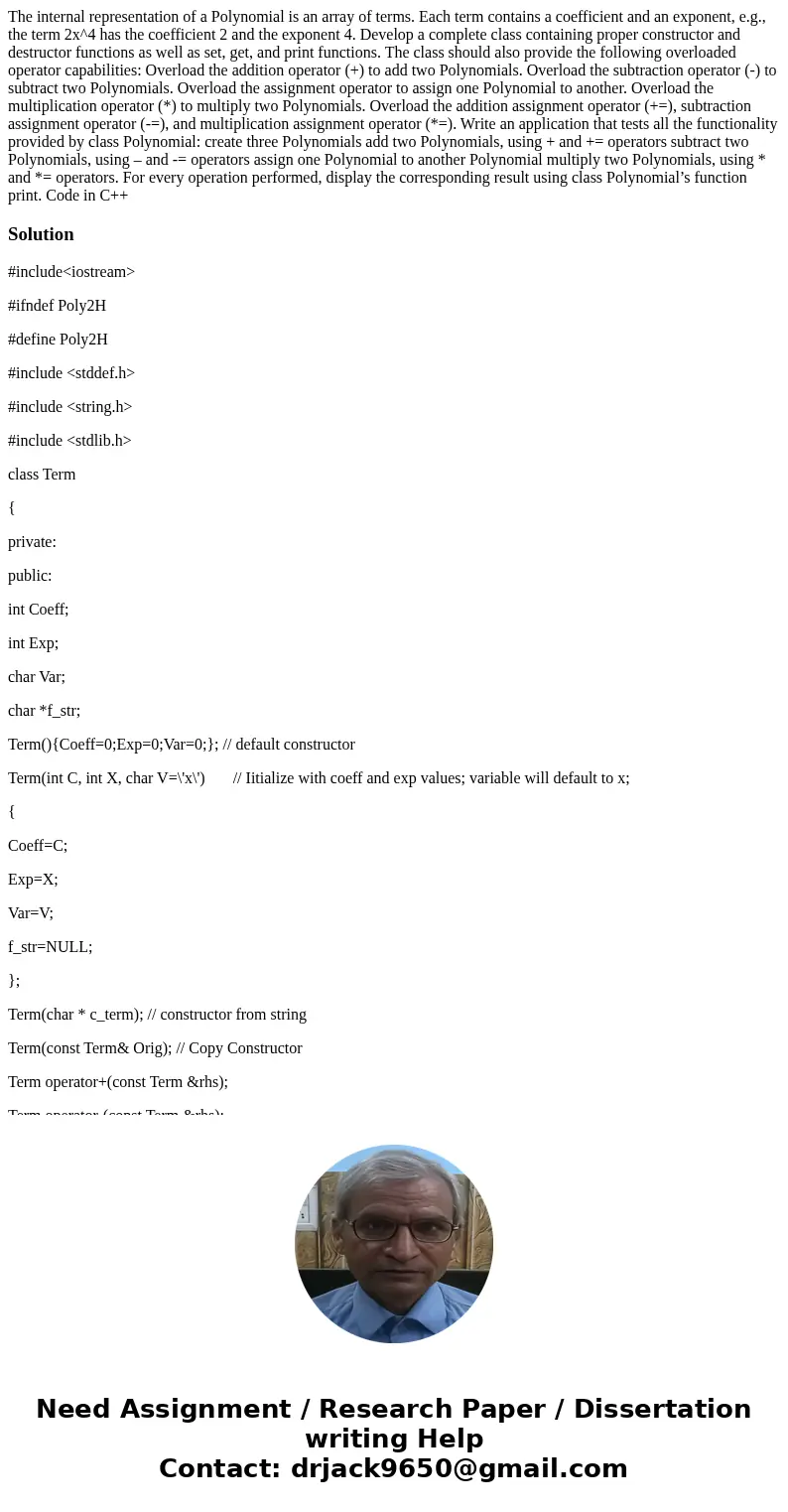
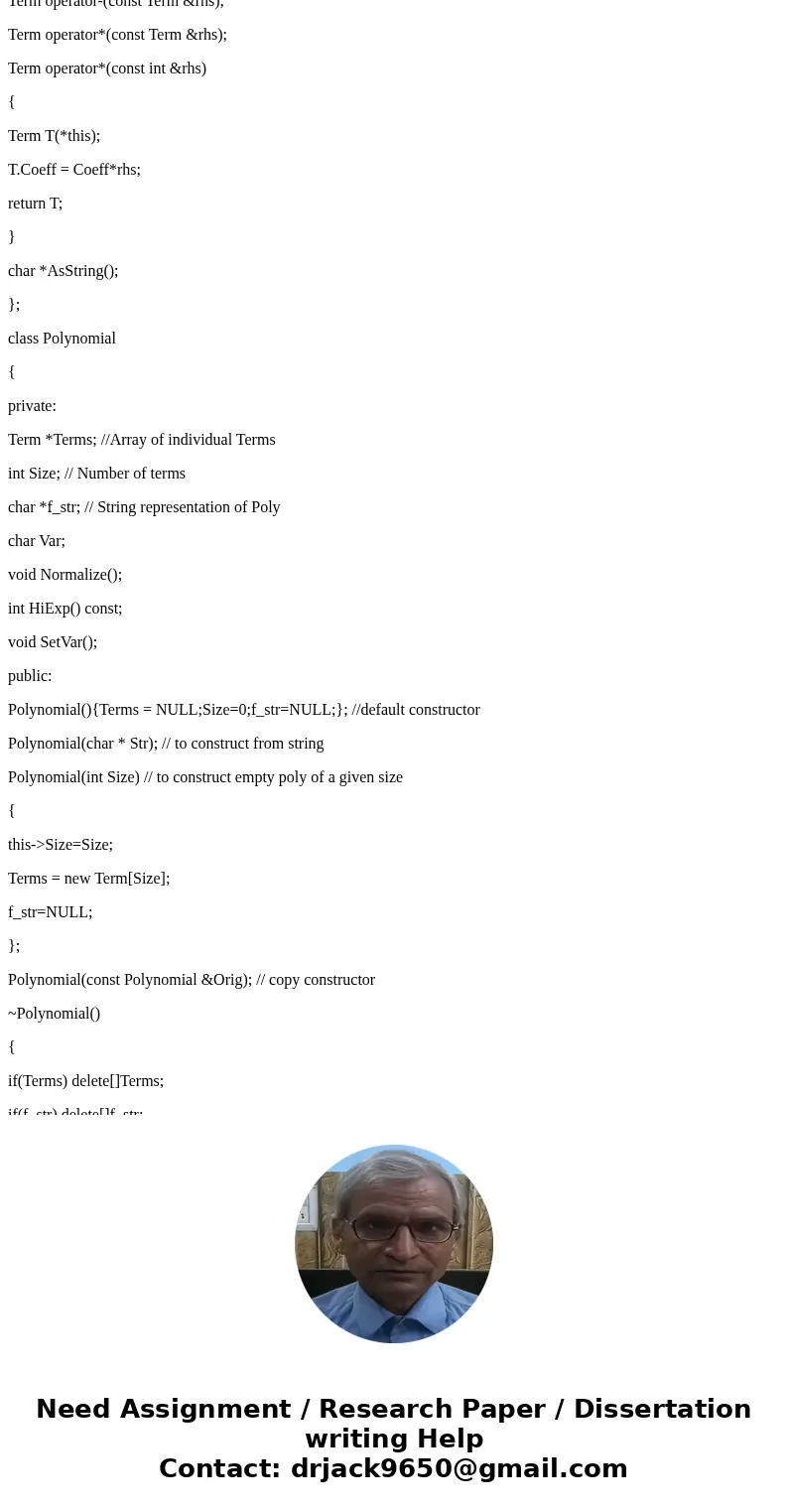
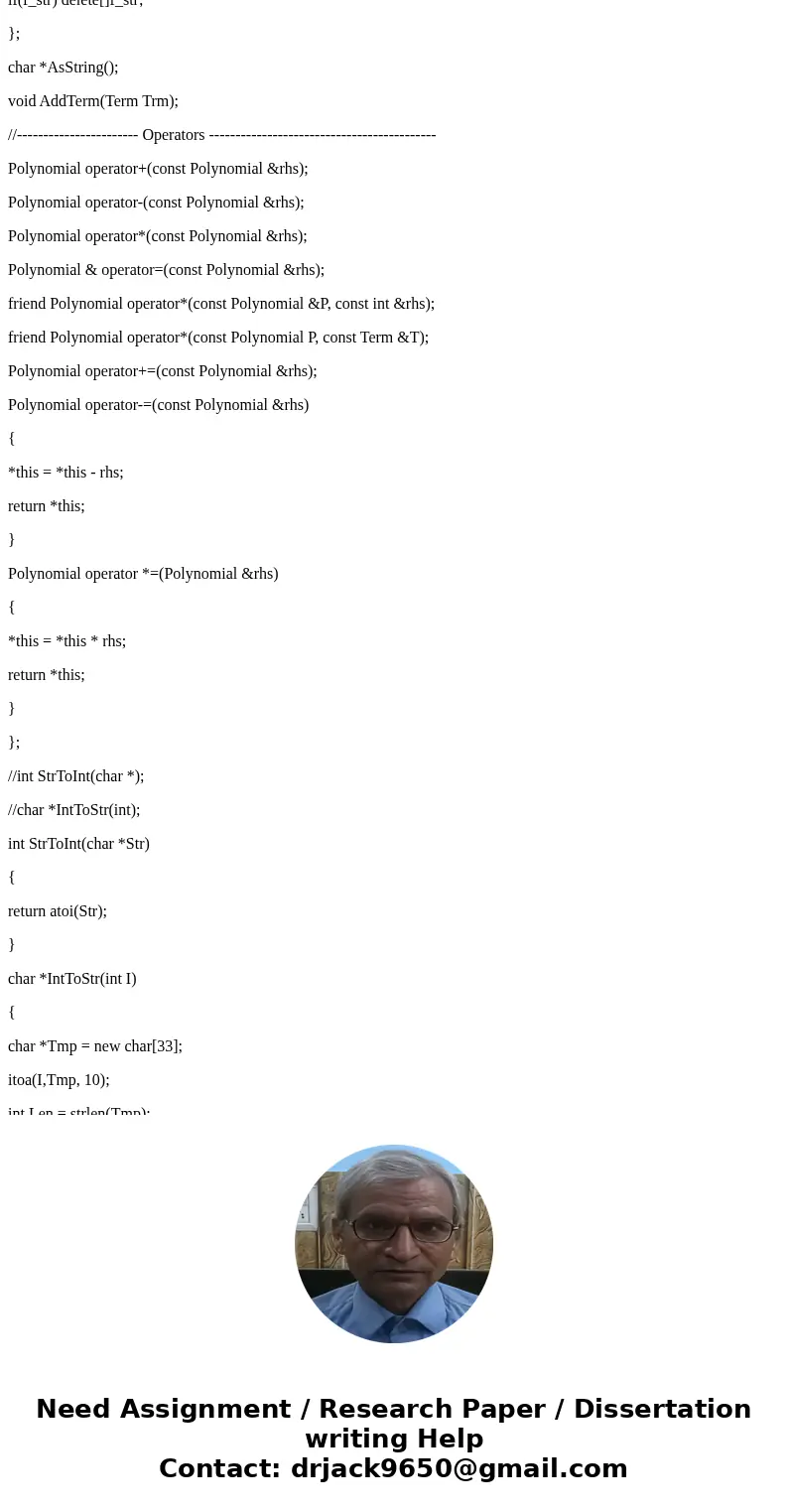
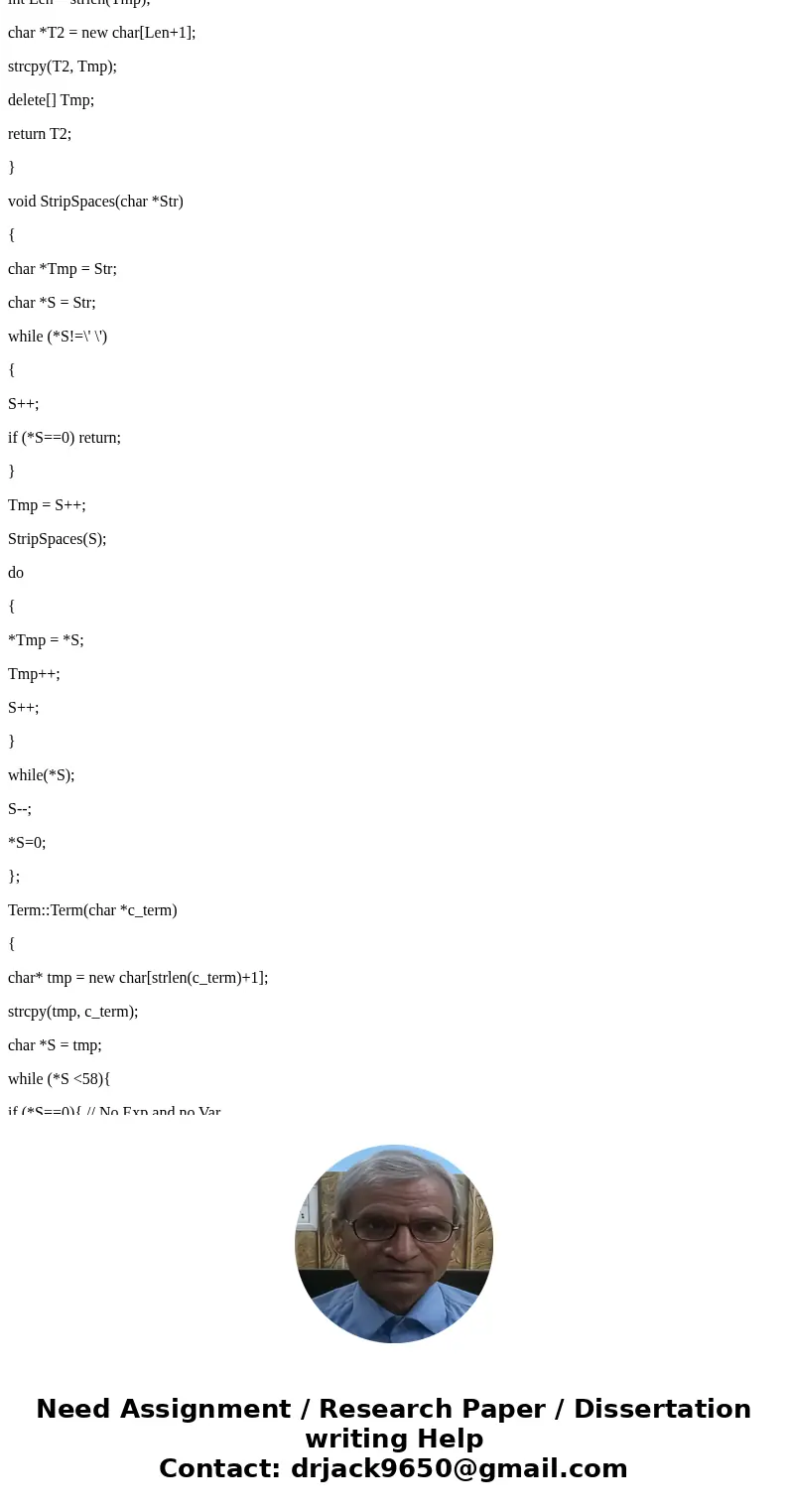
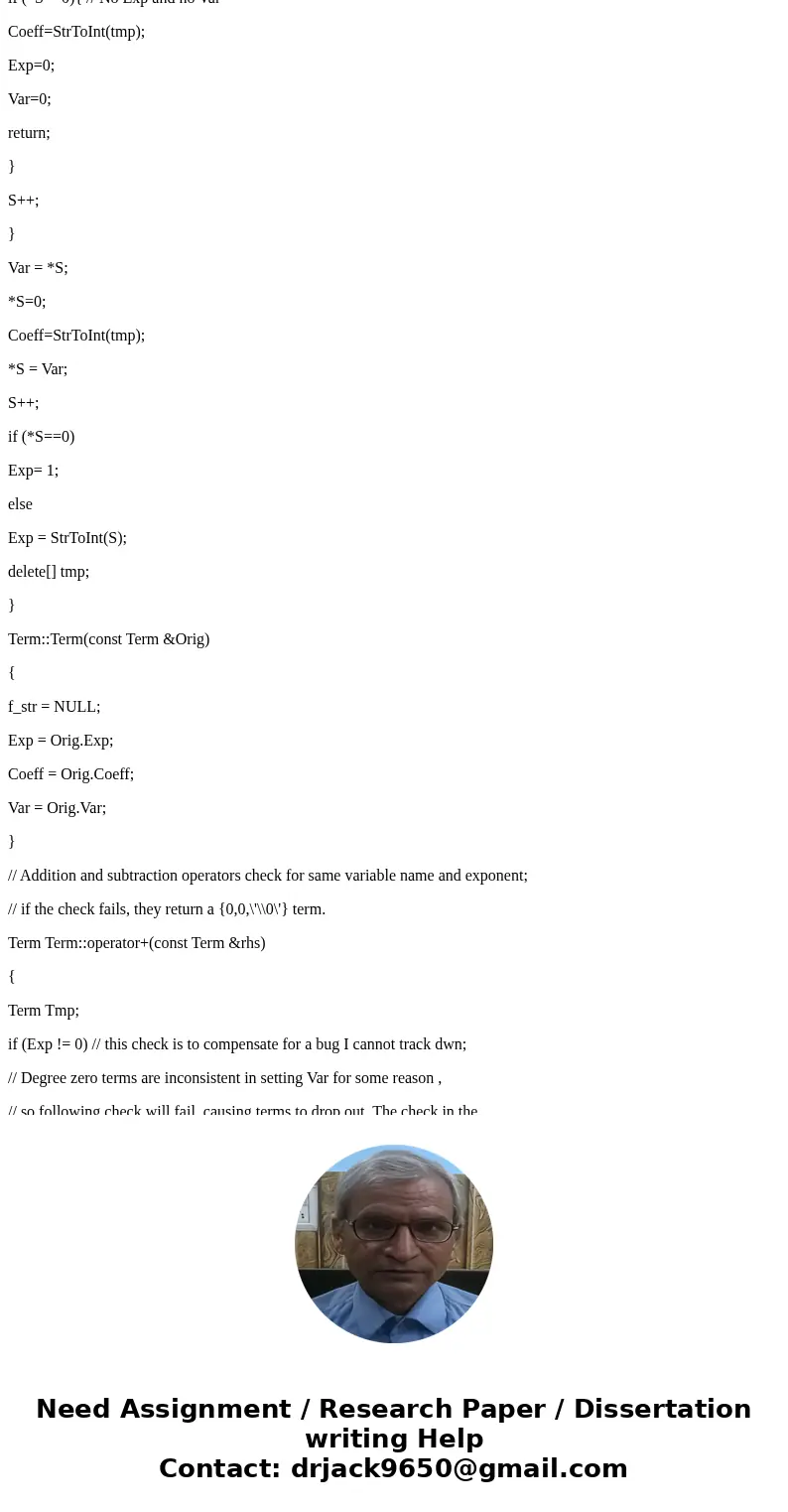
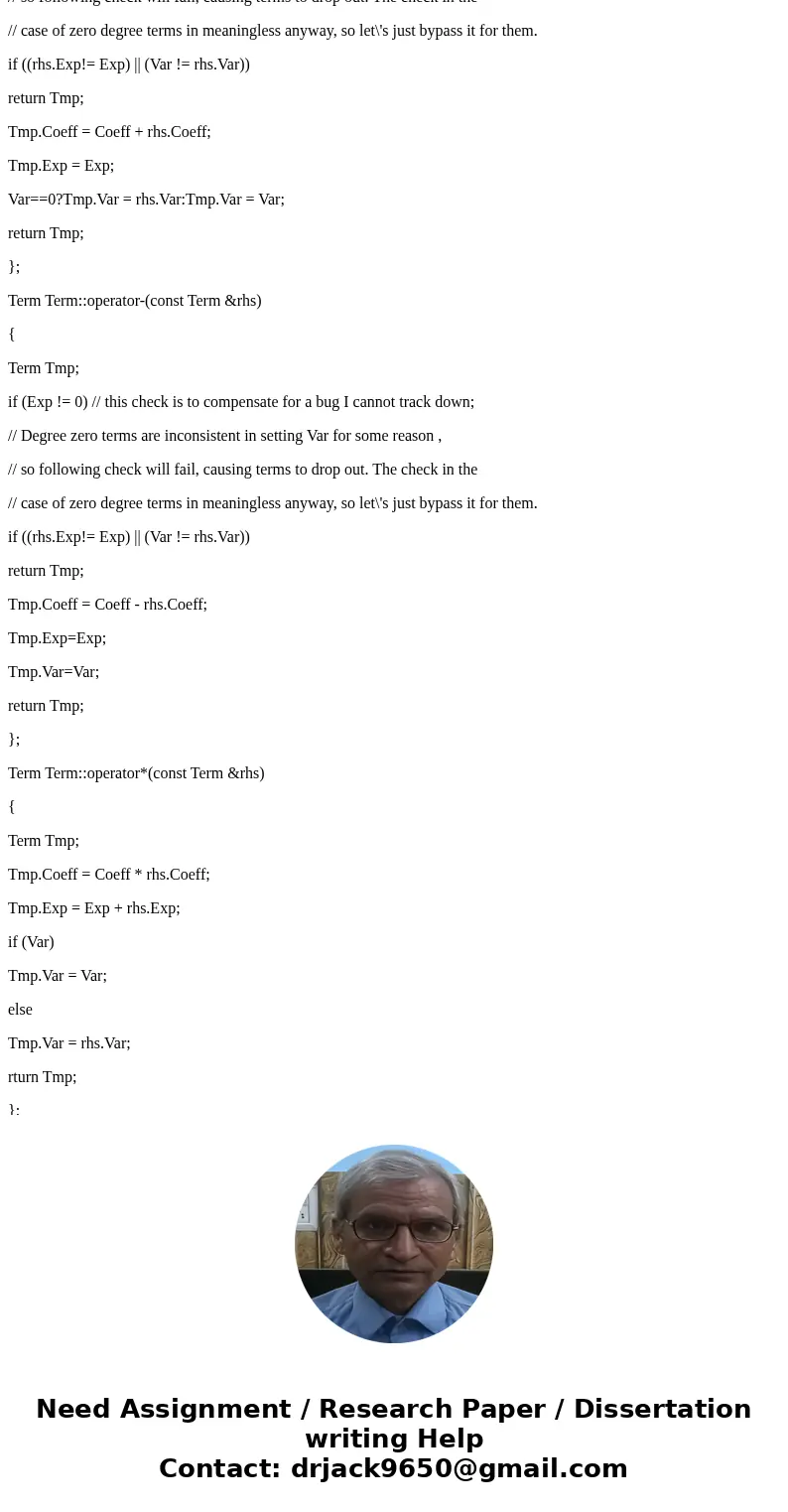
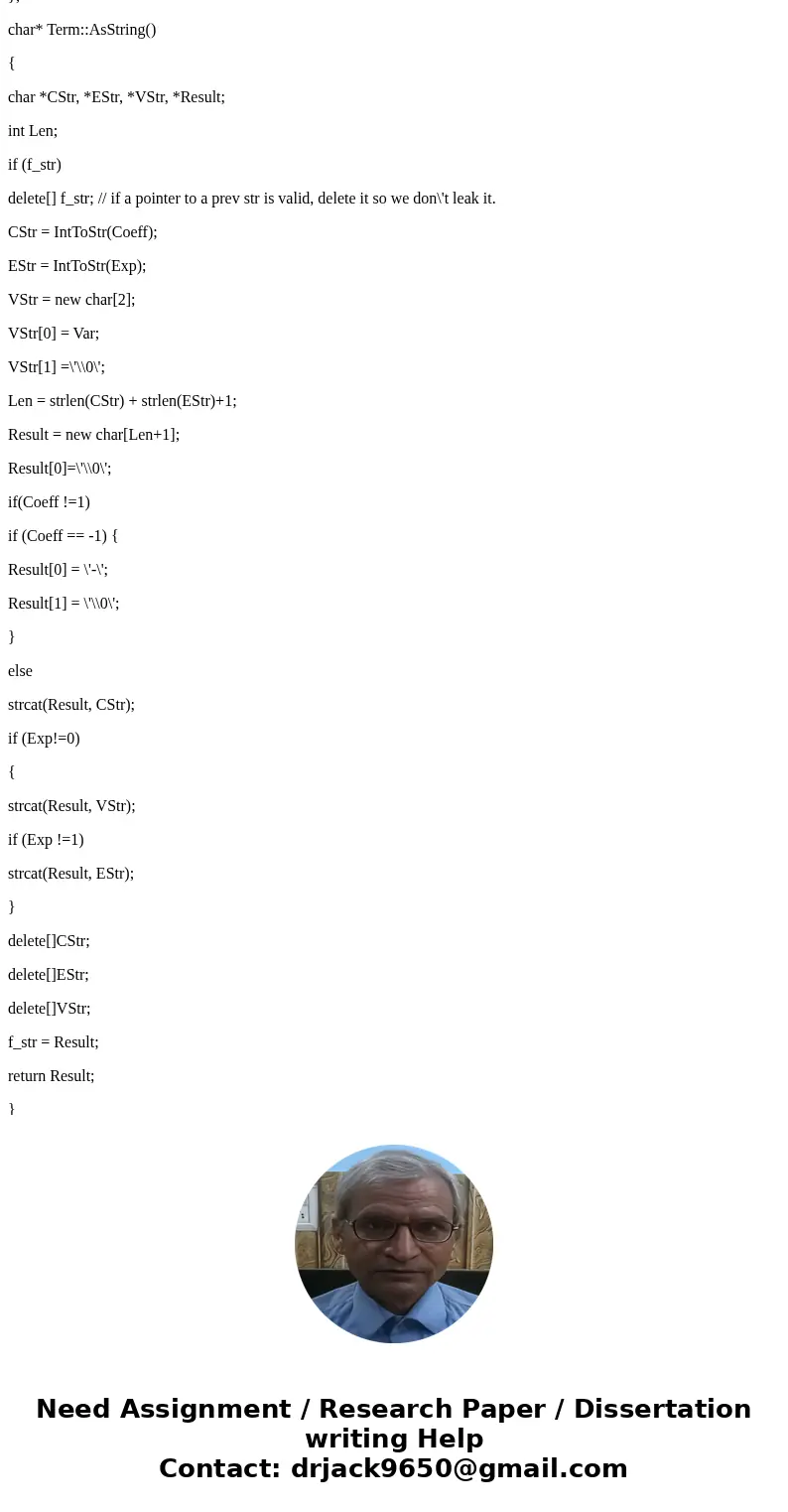
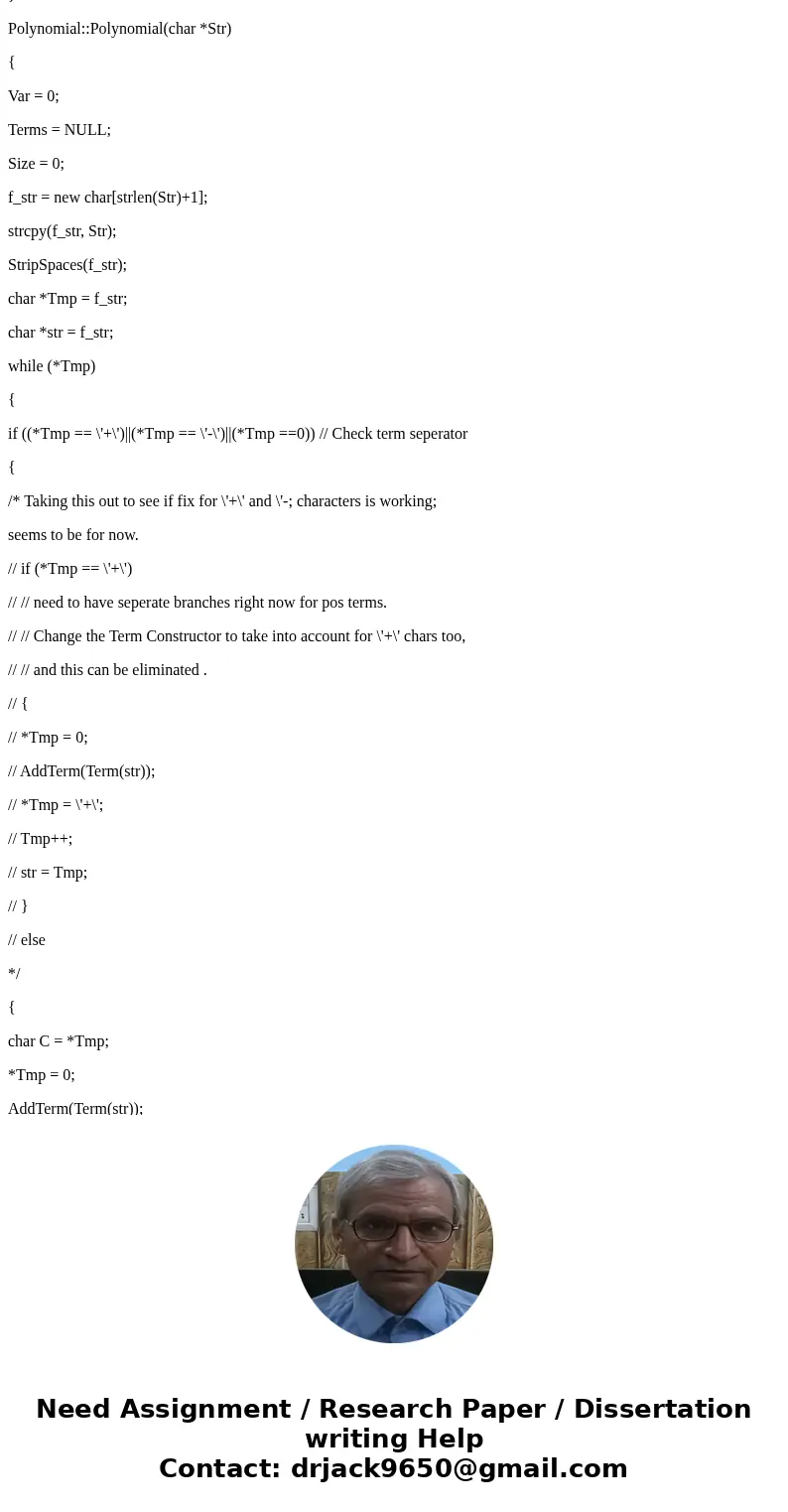
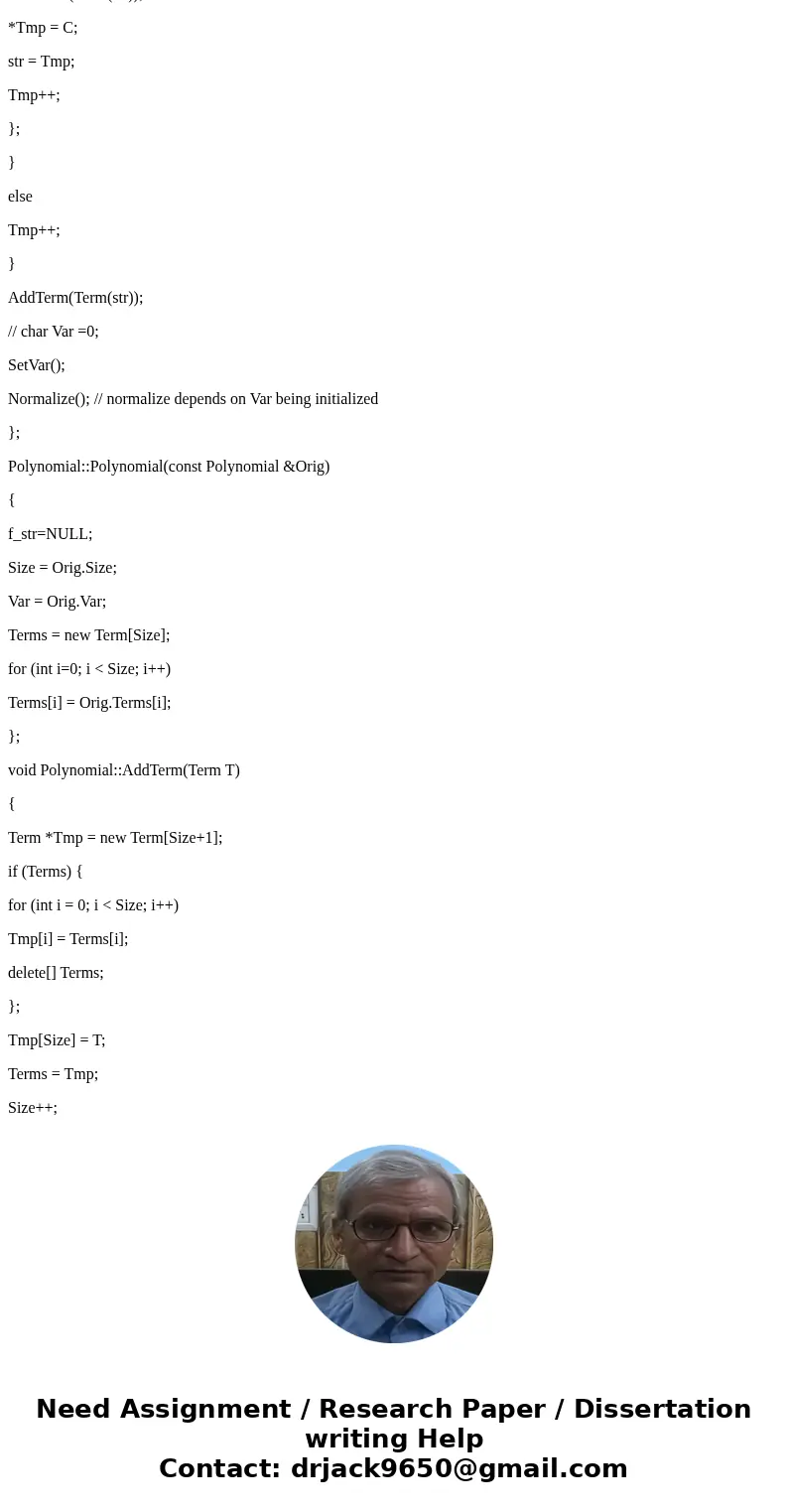
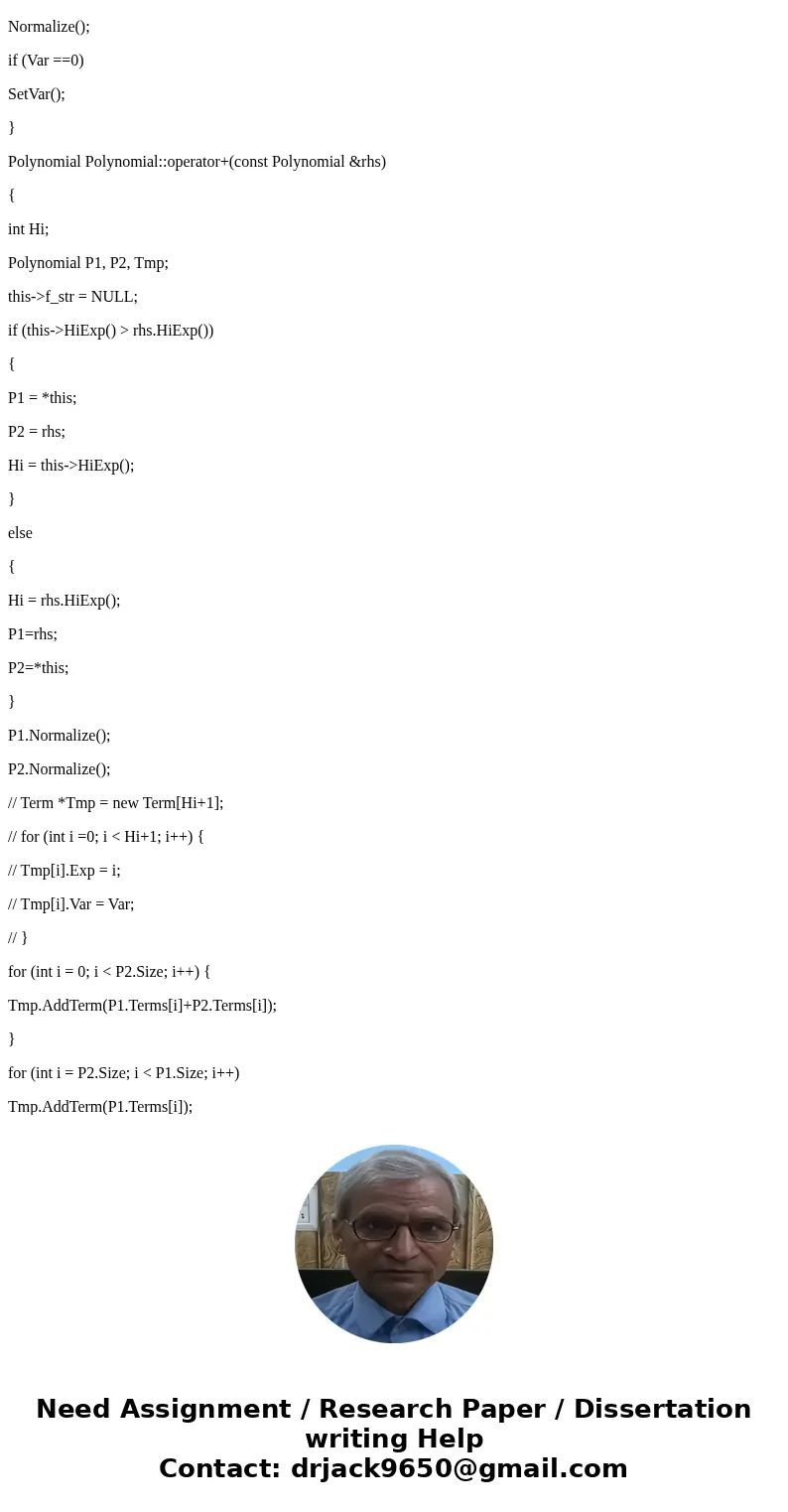
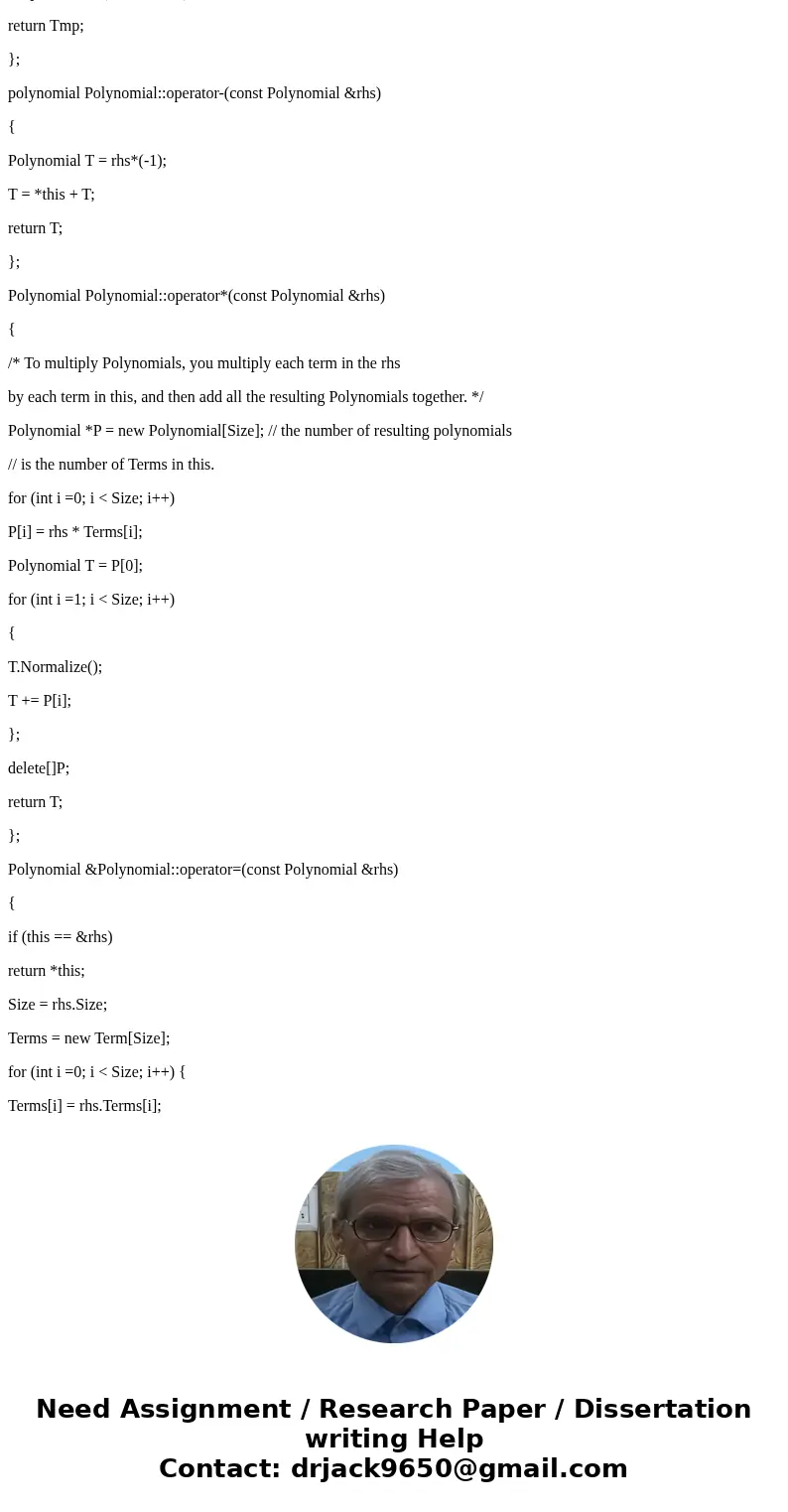
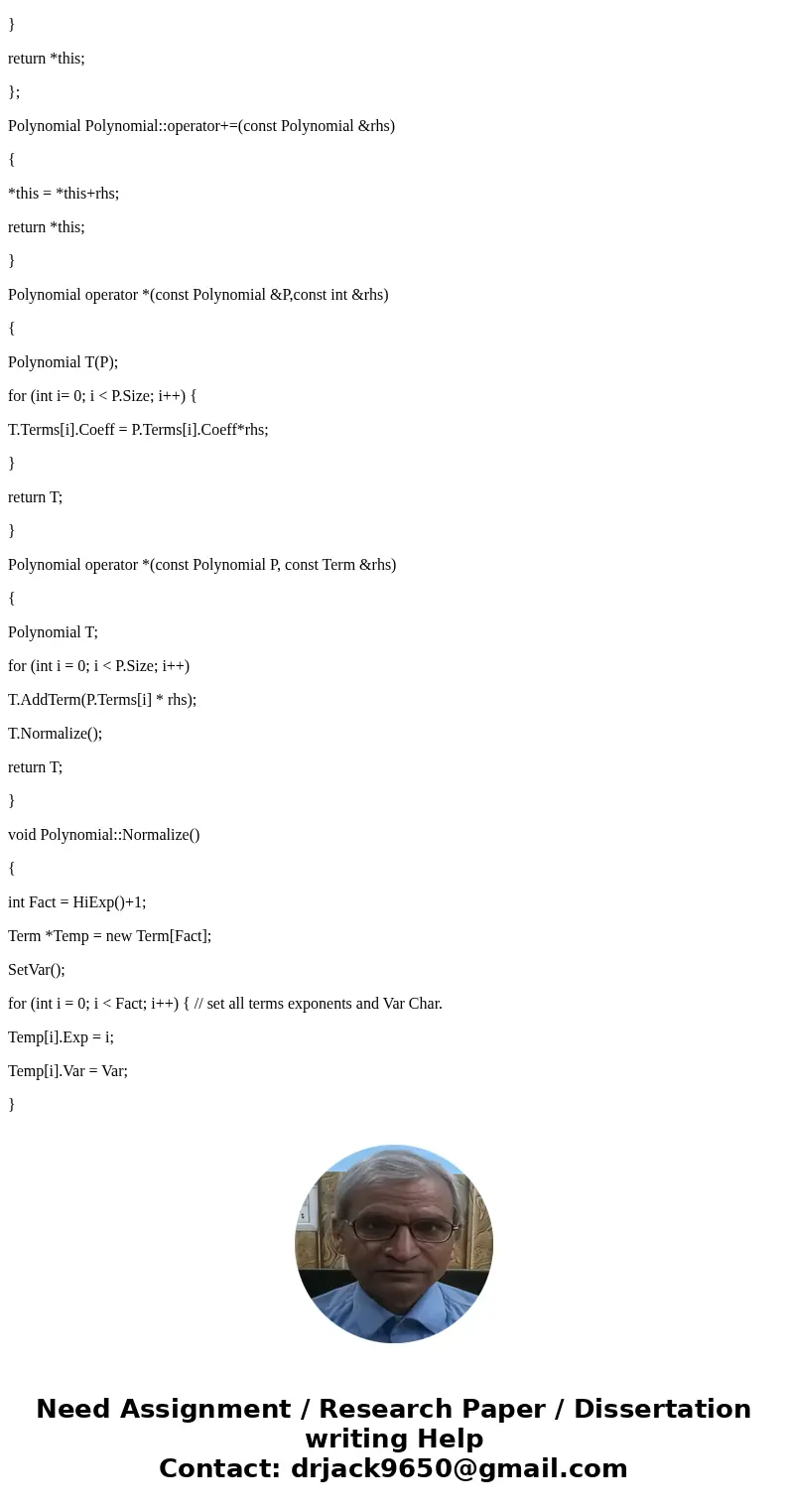
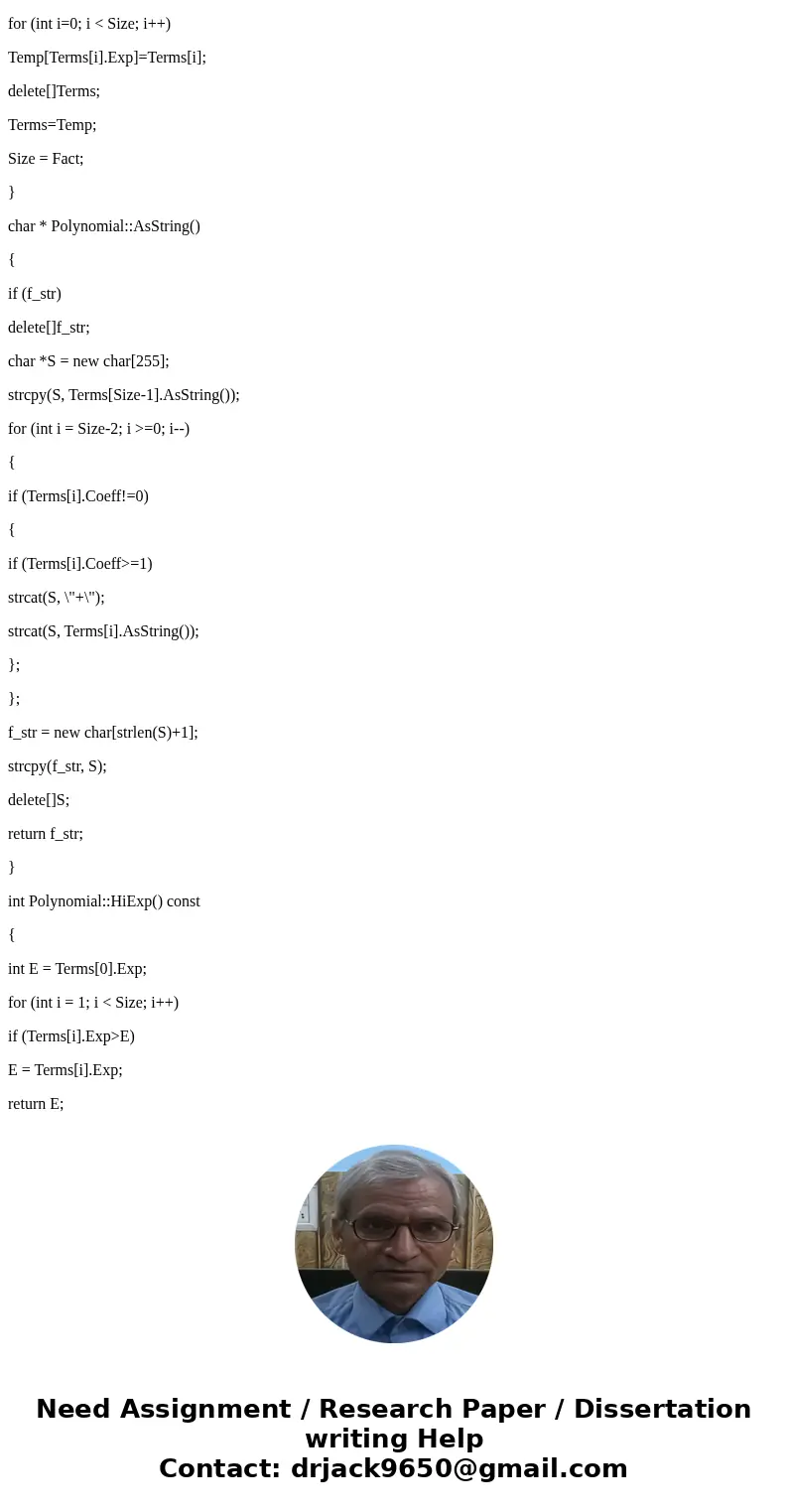
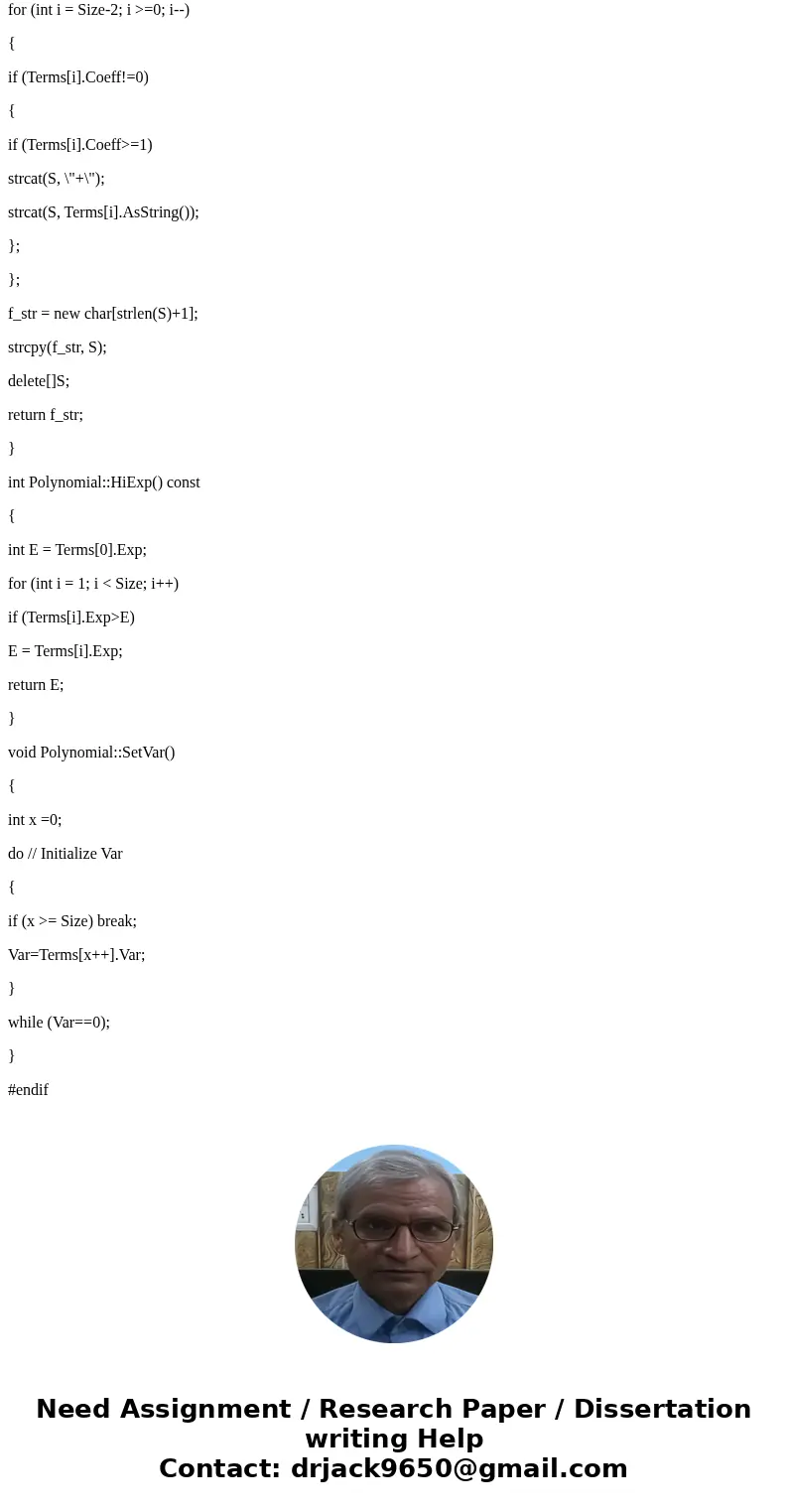
 Homework Sourse
Homework Sourse